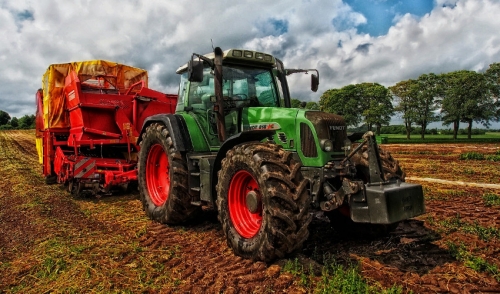
Everyone knows the value of recycling, but the more creative the recycling down on the farm, the more farmers can save both money and materials by meeting their equipment needs in unique and sustainable ways.
Compost
Composting is the easiest and most familiar type of farm recycling. Any biodegradable waste – manure, food scraps, soiled livestock bedding, decaying plants, etc. – can become useful compost that will fertilize crops and keep soil healthy and productive. Composting can also be done on a much smaller scale for personal use in the yard or garden, with equal benefits for personal gardens and flowerbeds.
Creative Farm Recycling Projects
There are many unique and innovative ways different materials and equipment can be reused for different farm projects, saving both money and materials. Popular and easy materials to recycle include…
- Feed Bags: With some clever sewing, empty feed bags can become reusable shopping totes, patchwork tarps or weed barriers. The material can also be nailed or stapled to walls to minimize drafts on coops or barns for fast repairs.
- Conveyor Belting: When a large agricultural operation replaces the wide belts on conveyors, those belts can quickly be reused as mats in stalls or flooring for a coop, or they can be used as heavy-duty weed barriers or to help cover muddy areas for better traction.
- Pallets: Wood pallets have many alternative uses on the farm, including becoming easy, simple gates, open compost bins, tool organizers, A-frame garden growing towers or trellises, fast pen fences and more.
- Tires: The large tires from tractors and other farm equipment don't need to be tossed when they can no longer be used as tires. Instead, they can be recycled as rustic flowerbeds or elevated planters, or shredded as mulch.
- Barn Wood: When a barn, shed or coop needs to be completely replaced, the wood of the structure can easily be recycled into fashionable furniture or built into bird houses, bird feeders, benches, picnic tables and other structures that can even be sold for a tidy profit.
- Windows: Old windows and glass doors can be refitted to create a rustic greenhouse, ideal for starting seeds or growing herbs or other plants that may have longer growing seasons or require more controlled conditions for the best production.
- Bricks: Old bricks with holes can quickly become a creative beehive or insect house when they are set up so insects can use the holes as shelter. This can benefit every farmer by providing a healthier insect population for pollination in the fields.
- Milk Cartons: Simple plastic milk cartons can quickly be cut into instant feed scoops. Intact cartons can also be used as waterers in the garden with just a few pinpricks in the bottom, when water-filled cartons are placed with the plants that need a drink.
- Wheel Barrow: A wheel barrow doesn't have to be in great condition to have great alternative uses on the farm. Even rusty or with broken handles or flat tires, a wheel barrow can become a rustic fire pit or a whimsical planter.
- Garden Hose: When a hose has too many holes or kinks to be effective at watering, it can quickly be wrapped into a mat or rug shape to become an upcycled welcome mat, perfect for a barn or shed to keep the floor cleaner.
- Buckets: Broken buckets with holes in the bottom can easily become upside-down planters for strawberries, tomatoes or similar plants. The plants will drape below buckets that are hung from their handles, increasing growing space with ease.
- Anything: Any broken tools, scrap metal, and other farm and garden equipment can be recycled into interesting artwork with an agricultural twist. From abstract forms to steampunk animals, flowers or person-like figures, this type of artwork is increasingly popular and can help farmers recoup the cost of the new tools and equipment they need to purchase.
With so many ways to recycle on the farm, there's always a way to reuse materials and turn even worn out, seemingly unusable materials into something new and practical.

Comments